From eating your food to drinking your blood, here's how to prevent camping pests from dampening your outdoor adventures.
8 Camping Pests To Watch Out For
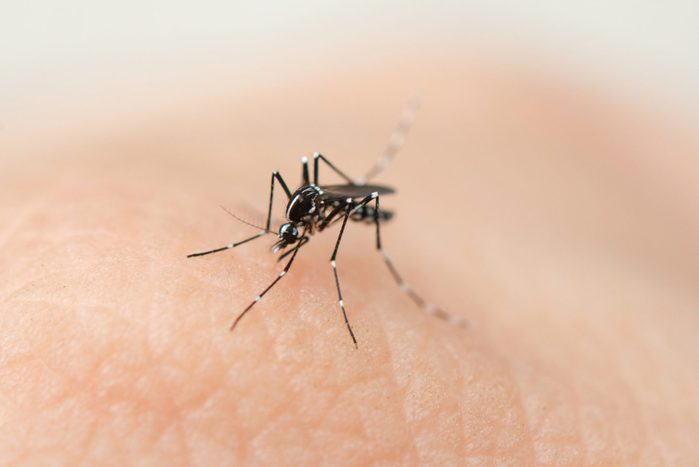
Mosquitoes
No matter where you live, mosquitos are common outdoor companions. “Mosquitoes are one of the most annoying insects, and they’re especially bad when you’re camping,” says Nicholas Kilby of Think Wild.
Start by choosing your campsite wisely. Avoid areas with standing or stagnant water like ponds, puddles and marshes. Also, seek places prone to breezes, which can prevent mosquitoes from swarming.
To further keep them at bay, you’ll likely need a combination of the following:
- Clothing: Wear loose clothing to cover up exposed skin. A recent study also suggests clothing color can make a difference. Green, purple, blue and white seem to deter mosquitoes, while red, orange, black and cyan attract them. Other studies have shown that stinky items like unwashed socks attract them as well.
- Chemical repellents: DEET and permethrin are usually effective but can cause allergic reactions and harm the environment, so try to use them in moderation. “DEET can corrode valuable camping equipment and prolonged exposure to high concentrations of permethrin has been linked to different types of cancer,” says Kilby.
- Natural repellents: Scents like citronella and eucalyptus can help keep mosquitoes away without harsh chemicals. “However, these methods don’t usually work when the mosquitoes are really bad,” says Kilby.
- Bug-repellant clothes: Some clothing lines are made from or treated with insect repellants. “Exofficio is one of my favorite bug-repellent clothing brands,” Kilby says, “and Sawyer makes great bug repellant for your skin and clothing that will not damage your gear.”
- Smoke: Smoke from a small fire can bring some relief. But never leave a fire untended, and extinguish it properly to prevent wildfires.
Once you’re bitten, resist the urge to scratch. Scratching increases your histamine response, which makes the bite itch more. And once the skin is broken, you risk infection. An anti-itch cream can help.
Why do mosquitoes even exist? “Mosquitos play an important role in the ecosystem, some species serving as important pollinators,” says Susan Getty, Public Policy Specialist, Wildlife at the Humane Society of the United States. They’re also a vital food source for certain birds, bats, fish, dragonflies, frogs and others. Find out if bats eat mosquitoes.
According to the Xerces Society for Invertebrate Conservation, there are roughly 175 mosquito species in the U.S. Few transmit disease, although it’s still a good idea to avoid getting bitten.
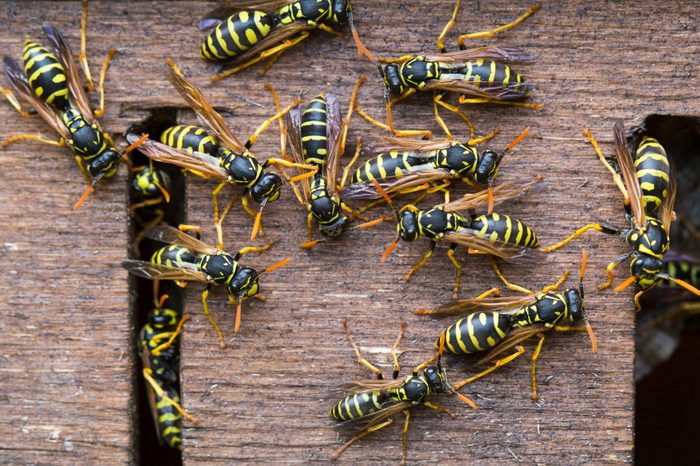
Flies, Wasps and Ants
Unlike mosquitoes, flies, wasps and ants are more attracted to your food than your skin. Chemical and natural repellents can deter them, but not always reliably. Here are some better solutions:
- Clean up meals and cooking surfaces promptly.
- Camp away from their natural food sources, like manure, decomposing logs and flowering bushes.
- Check trees, logs, man-made structures and the ground for wasp and ant nests before pitching your tent.
- For flies, keep a small, smoky fire burning while at camp and extinguish it properly each time you leave, to prevent wildfires.
If you see honeybees and bumblebees, be kind and remember they’re more interested in flowers than you.
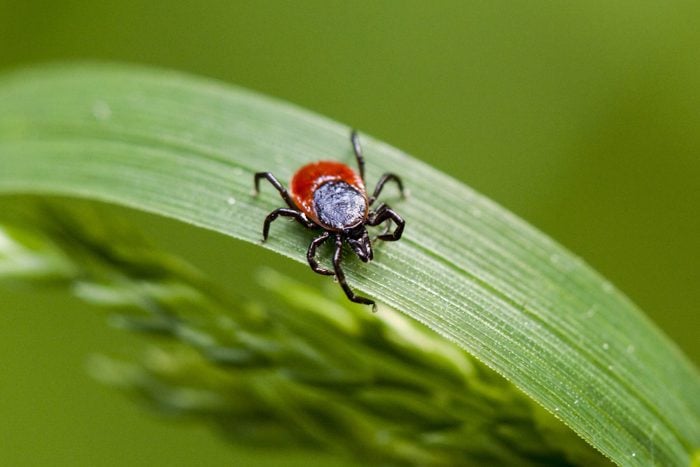
Ticks
“Ticks are not only nasty blood sucking parasites, but probably more unsettling are the many diseases that ticks carry and transmit to humans,” says Kilby. Depending on what part of the country you’re in, those could include Lyme disease and Rocky Mountain Spotted Fever.
To lessen your chances of an unwelcome camping blood-sucker:
- Wear long sleeves and pants.
- Tuck your pants into your socks, so it’s harder for ticks to get on your skin.
- Walk in the middle of the trail, away from tall grasses and heavily wooded areas.
- Wear light-colored clothing so you can spot them on you more easily.
- Use repellents like DEET, picardin and permethrin. “All similar to mosquito products, but I would add DEET spray, because I don’t mess around with ticks!” says Kilby.
- Check yourself, children and pets frequently for ticks, including exposed and clothed parts of the body. Ticks will hang on to clothing and gear and attach to humans or pets later.
Ticks are likely to attach themselves to moist, warm areas like armpits, behind the knees, under head hair and around the ears and genitalia. If one does get attached, remove it immediately. If the head breaks off in your body, seek medical attention.
Also, take a photo and keep the tick in a bag or wrapped in a piece of tape so doctors can analyze it if you do get sick.
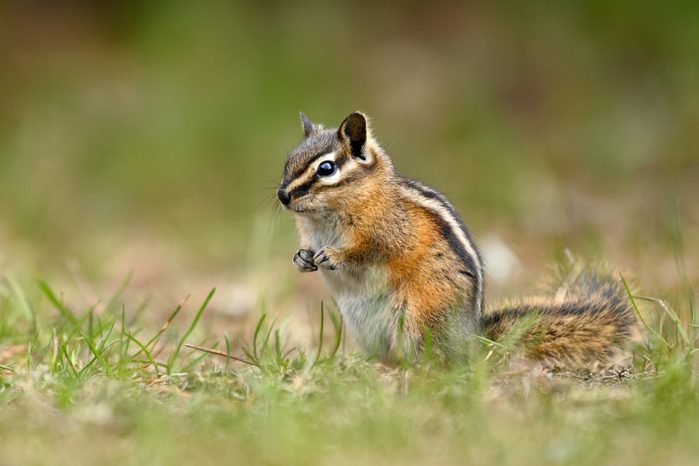
Small Mammals
Mice, squirrels, chipmunks, wood rats, raccoons, opossums and pikas each have their wild habits and agendas. However, they’re consistent on one thing — your camping food provides easy calories.
“Squirrels have also been known to get into toothpaste, sweet-scented deodorants, and even chew on wires in your car if you let it sit for too long,” says Kilby.
To discourage them:
- Do not feed them. No matter how cute those chipmunks are, feeding encourages them to seek out more food from humans, which can make them aggressive. “Fed animals are sometimes killed by management authorities due to their developed, unwanted behavior,” says Getty. The wrong foods can also hurt them physically and make them unprepared for winter.
- Keep food, garbage and scented items secured in a car or sealed container, like a hard-plastic tote with a sealing and locking lid. “Zip locks do not work and squirrels will chew through backpacks in order to get to food,” says Kilby.
- Wash dishes thoroughly in an area away from where you sleep, and keep a clean camp. “Clean up those s’more remnants in the fire pit!” says Getty. “And remember, they can climb and dig, so don’t bury trash.”
If rodents get into your food, do not eat anything they may have nibbled or defecated on, since they can carry diseases like hantavirus and bubonic plague. Wash and disinfect all surfaces they may have come in contact with.
If they get into your car or camper, remove anything that might be attracting them (including pet food). Seal up any holes as small as a quarter, and spray a water-peppermint oil or water-eucalyptus oil perimeter around the doors and other openings. Here are some more tips on rats, from the Humane Society of the United States.
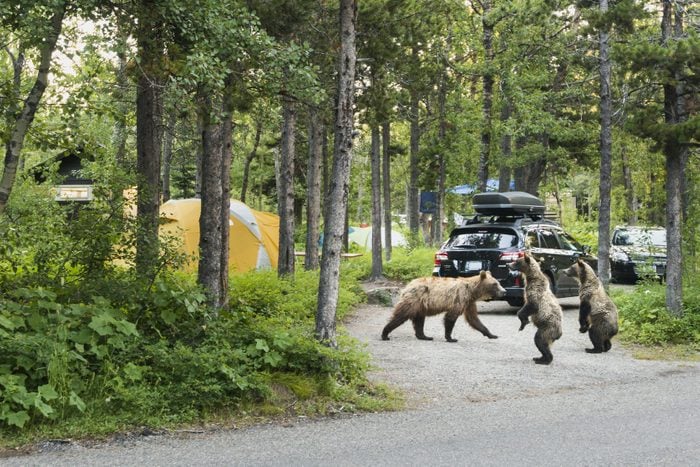
Bears
From Florida to California, bears’ amazing sense of smell sometimes leads them to campgrounds. “Bears can smell better than a bloodhound and are attracted to that which you may not expect, like perfume, lotion and citronella candles,” says Getty. Regular storage containers are no match for their strength and problem-solving abilities.
If you’re camping in bear country:
- Follow local guidelines about hanging or locking away food in a secure location.
- Ideally, keep attractants in designated bear-proof boxes and garbage bins, not in your car.
- If there are no bear boxes available, store food and garbage in your car or hard-sided camper. “Make sure your car is locked when you go to sleep or leave for the day because bears have been able to open car doors to get to food,” says Kilby.
- If you’re tent camping, store all food, snacks, toiletries, sunscreen, candles, insect repellents and the clothes you cooked in outside your tent in bear-safe containers. Never eat in your tent.
- Carry bear spray and learn how to use it before going out.
Bear-human encounters are scary. They’re usually worse for the bear, because wildlife officials often have to kill them if they’ve become comfortable foraging from people.
If a bear does enter your campsite, remember they are likely not after you, just your garbage and food. Follow these recommendations from the U.S. Forest Service.
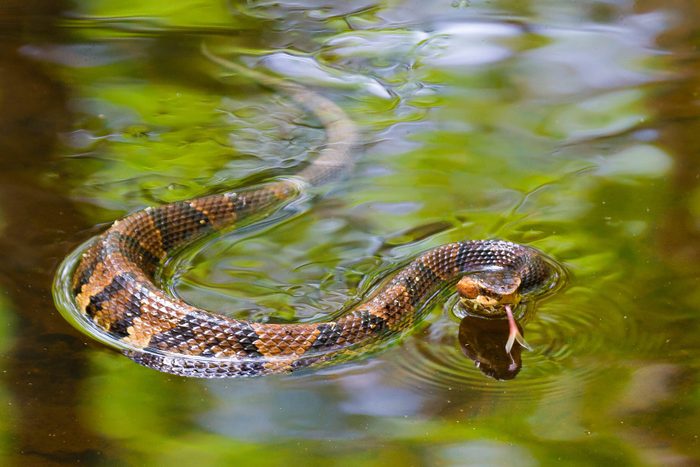
Snakes
The best way to avoid a snake encounter is to pick a camping spot away from rock or log piles, or areas of heavy brush where snakes might be living. Also avoid camping next to a water source. “Note that snake repellents do not work,” says Getty.
Most snakes are shy and not venomous. But because they’re cold-blooded, all snakes can be tempted by the warmth of a human in a sleeping bag. To prevent an unwanted snuggler, always keep your tent zipped with the pulls at the top of the door, not the bottom, where a snake can push them open with its head.
If you see a snake in camp, give it some space and it will likely soon be on its way. Try to identify whether it’s venomous so you know if it’s a threat to your safety. If it is, ask a park ranger or campground host to help remove it. If you’re bitten, follow these guidelines from the U.S. Forest Service and seek medical attention immediately.
Here are more tips on how to remove snakes from the Humane Society of the United States.
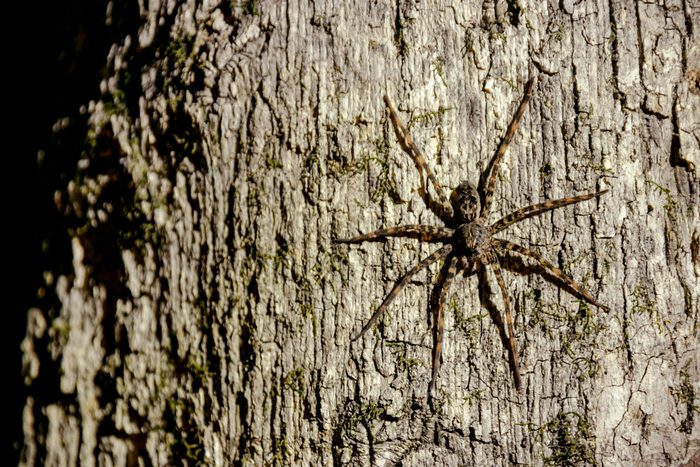
Spiders
Spiders are wonderful for our ecosystems, but terrible to share a tent with. To keep them out of your private space:
- Keep your tent zipped with the pulls near the top of the door, where spiders are less likely to wander in.
- Spray the perimeter of your tent or camper doors with bug spray or a solution of peppermint, tea tree or eucalyptus oil (10 to 30 drops in a bottle of water).
- Repair any holes in your screens or walls.
- Check your stored camping gear for spiders before you pack it in your car.
Also, if you’re in scorpion territory, follow the snake advice above to prevent encounters. “Like snakes, scorpions love dark hiding places, so keep your clothes and pack off the ground, and check your shoes, sleeping bag and tent before use,” says Getty. There are several types of house spiders you’re likely to see in and around your home. Have you heard about wolf spiders?
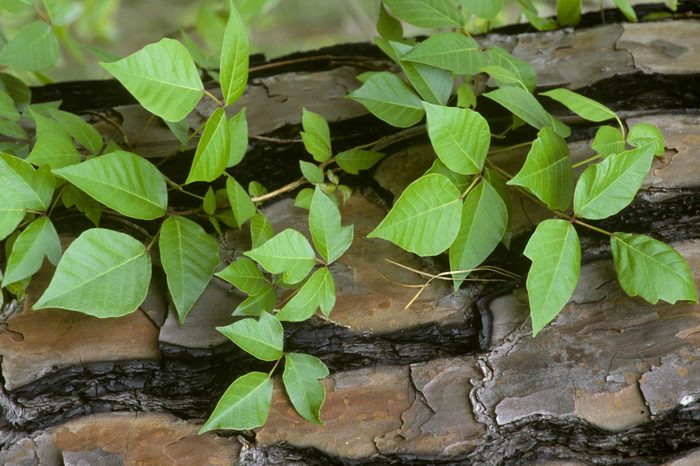
Poisonous Plants
While campgrounds try to eradicate poisonous plants, it’s likely you may still encounter one. Poison ivy, poison oak, poison sumac and poisonwood can all cause painful rashes.
Learn to identify the ones in your area. When in doubt, ask a park ranger or campground host. Research how to treat the plants particular to your area prior to your trip in case you lack cell service at the campsite.




















